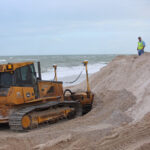INDIAN RIVER COUNTY — More than 40 homes in the Antilles community north of Vero Beach on US 1 and hundreds more in the county have toxic Chinese drywall causing a variety of health and homeowner issues.
U.S. Congressman Bill Posey arranged to tour a few homes at the Antilles community Thursday to get a first-hand look at the damage the drywall has done. Rep. Posey said that not much has been done on the various government levels since complaints started pouring in regarding the material.
“We’re a little bit frustrated,” he said, adding that there is a movement now in Washington, D.C., to determine what needs to be and what can be done.
“There’s so much unknown,” the congressman said.
By Rep. Posey’s estimation, there are at least 900 homes in Florida that have the toxic sheets of drywall. But his figures are much lower than those reported by Antillies homeowner Ed Tighe, who said that there are at least 36,000 cases in the state and believes the number to be “grossly underestimated.”
Jim McAlhany, of McAlhany Construction Company in Vero Beach, said that his company has documented at least 400 cases in the county and 43 in Antilles. He has worked with homeowners in the neighborhood to remove the drywall and replace it.
Attempts to confirm the number of cases in Indian River County by contacting the U.S. Consumer Safety Product Commission were unsuccessful. The agency is acting as the point of contact for homeowners to report suspected cases of the toxic drywall.
Homeowner Keith Morgan told Rep. Posey and other state and county leaders Thursday it would cost him an estimated $110,000 to tear out and replace all the Chinese drywall in his home and to replace all the pipes, valves and other materials in the house that the drywall gasses had ruined.
He and his wife, Shirley, displayed a drawer full of corroded and tarnished jewelry, silverware and metal picture frames that had been pitted.
Their health deteriorated to the point that they had to move out.
“We’d like to live in our house again,” Keith Morgan said. But the family won’t have the drywall removed and replaced until there is a protocol in place by the government for remediation, he said.
“That’s really the hang-up we’ve got,” Morgan said, noting that he would like to see a certification process in place, too, so that anyone trying to sell their home later can prove that their home is Chinese drywall free.
Rep. Posey said during the tour that there is no protocol in place at this time because no one really knows how widespread the problem is and to what severity.
Also, the government needs to determine what legal recourse there might be — not just for homeowners but for the government, too.
Rep. Posey said that President Barack Obama would be traveling to China soon and is expected to discuss the drywall issue with officials there. What might come out of that discussion remains to be seen.
“It leaves us with a lot of balls up in the air,” the congressman said.
Ed Tighe said during the tour of his home that not all drywall from China is corrosive and those pieces that are tend to vary in their toxicity.
The toxic drywall emits a gas that corrodes copper and pits metal. It can also put off a sulfur or “rotten egg” type smell. The gases are also known to cause health issues that range from headaches to burning or itching eyes and skin. Other complications can include asthma and other respiratory problems.






